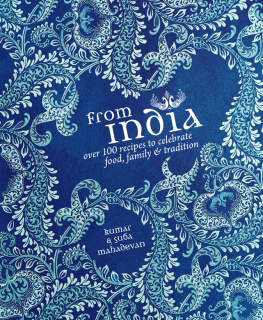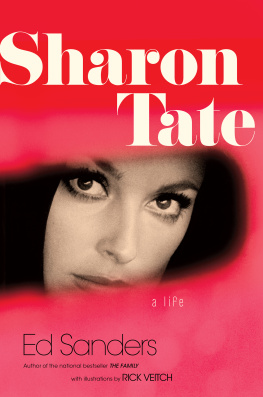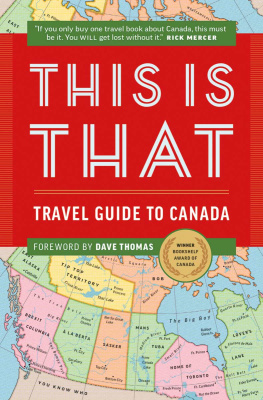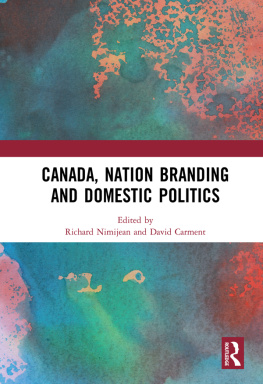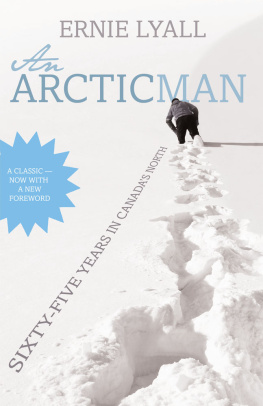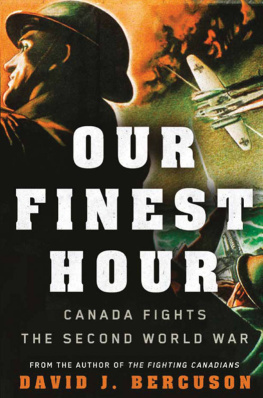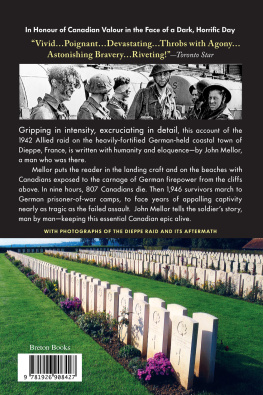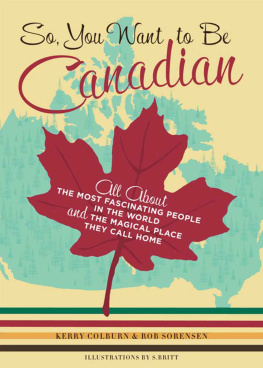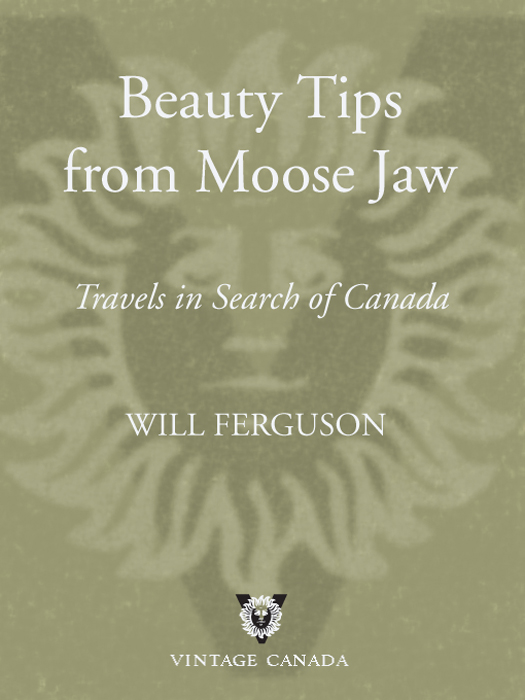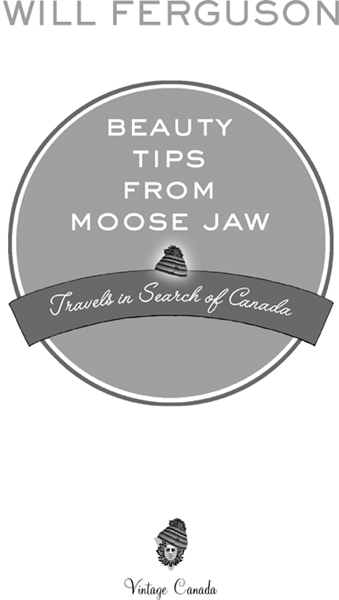BEAUTY TIPS FROM MOOSE JAW
Winner of the 2005
Stephen Leacock Medal for Humour
Funny and insightful.
The Montreal Mirror
With a remarkable ability to examine the weird quirks and cultural absurdities of his motherland through the eyes of a bemused, excited and sometimes cynical tourist, [Ferguson] brings humour and real life to his search. A hilarious, observant, personable journey.
The Observer
You have to love self-deprecating funnyman Will Fergusons latest. Beauty Tips is part out-there travel guide and part love letter to our vast country.
Chatelaine
Snapshots of a road trip through Canadas back roads and its well-travelled highways. The stories cleverly combine personal anecdotes, humour and contemporary landscapes.
Fastforward
[Ferguson] delves into the soul of the cities he visits, sometimes climbing into helicopters, seaplanes and kayaks, and attending underground poetry slams.
Airlines Magazine
Ferguson writes like a house on fire. Beauty Tips is a highly eccentric travelogue based on a ramshackle tour of the countrys more colourful outposts.
The Vancouver Sun
Eloquent and well-read. Ferguson is adept at breezily whacking the underbelly of his sprawling, haphazard country.
Scotland on Sunday
A funny and thoughtful take on what it means to be Canadian packed with information that all Canadians should know.
Monday Magazine
A very idiosyncratic, witty travelogue.
Ottawa Citizen
Beauty Tips offers the right balance on this road trip from Canadas West to East. Glimpses into the authors life provide a context for the discoveries he makes about history, geography and humanity.
See Magazine
Fergusons strength does not lie in whether he writes funny or not. His strength is that he writes so well.
Victoria Times-Colonist
Leavened with humour and weighted with history It rekindles ones sense of wonder about this sprawling country.
The Gazette (Montreal)
An idiosyncratic travel guide to the highs and lows of Canadian culture, history and landscape.
The Big Issue
The title story, in which Ferguson has his limbs and his ego massaged at a Saskatchewan health spa, perfectly represents the books twin charms: Fergusons comic cynicism, and his descriptions of intriguing events and individuals tied to the places he visits.
Publishers Weekly
[Ferguson] evokes his selected outposts so entertainingly. [Hes] the kind of observersharp-eyed and irreverentthat a reader likes to sojourn with.
The Washington Post
for Alex
CONTENTS
CHAPTER ONE:
CHAPTER TWO:
CHAPTER THREE:
CHAPTER FOUR:
CHAPTER FIVE:
CHAPTER SIX:
CHAPTER SEVEN:
CHAPTER EIGHT:
CHAPTER NINE:
CHAPTER TEN:
introduction
CANADA IS
ITS RARE TO REMEMBER exactly where you were when an idea first occurred to youor at least, its rare for me. I usually wander through life gathering notions and hunches the way trouser pockets gather bits of lint; Im not really sure how they got there, but there they are. In this case, though, I can recall vividly where I was when it dawned on me that Canada is not a country but a collection of outposts: it was while I drove through a night of heavy rain, into the realm of a legendary republic, a sleeping child and drowsy spouse beside me.
Wed been on the road for hours, heading into northern New Brunswick. The wipers sloshed back and forth, barely able to keep the windshield clear. Bucket-throws of water washed across our view. At midnight, we crossed over into dangerous territory. The Republic of Madawaska. A self-proclaimed independent state, Madawaska is wedged between the provinces of Quebec and New Brunswick and the state of Maine. The population is francophone, but the people are neither Qubcois nor Acadian; they are les Brayons. And Madawaska is their heartland: La Rpublique.
Northrop Frye, scholar and soul-searcher, noted that what set Canada apart in the western hemisphere was our lack of a distinguishable frontiera line that advanced purposefully across the map like an isobar separating one world from another, with settlement on one side and vanishing wilderness on the other. In this, our experiences diverged drastically from those of the United States. The American frontier thesisa heavily symbolic narrative of progress and order steamrolling over the chaos of an untamed landmay be historically suspect, but its psychological impact on American society cannot be underestimated. By contrast, Canadian historians advanced a metropolitan thesis, in which the flow of ideas and goods fanned outward from various urban centres to small scattered pockets of civilizationto outposts, in effect. In a country as sparsely populated and as vast as Canada, it could hardly have been otherwise, and this reality of who we are is played out before our eyes from the window of any given airplane on any given night. Beyond the luminous glow of the major cities, the metropolis melts away into a yawning darkness, an empty space punctuated only by intermittent clusters of light.
The effect upon the Canadian psyche, Frye argued, was something he called the garrison mentality: a sense of dread and loneliness bred into us from cowering behind palisaded walls, far from home in a land as savage as it was indifferent. The existential heebie-jeebies, as it were. (Our obsessive love of enclosed shopping malls can be seen as a continuation of this nervous tic, though personally I blame the weather.)
But garrison is too dark a word. Garrison suggests gnawing despair and impending attack. I prefer the term outpost, because it includes a wider range of possibilities. Outposts are not only geographic; they can be linguistic, political, culturaleven philosophical. I think of French Quebec and English Victoria, but also of the populist ideals embodied in Calgarys unflagging optimism; I think of the exiled Acadians and the outcast Loyalists, of First Nations, once shattered, now regrouping. I think of failed utopias and deluded colonization schemes. Of fortunes lost and fortunes found. I think of mythical kingdoms and gold mountains. I think of the descendants of the Underground Railroad and the Gaelic communities of Cape Breton, and of the Cree in my hometown and the Mennonite colony nearby.
Outposts can become enclavesthe Anglos in Montreal or the Lebanese in Charlottetownand enclaves can disappear. Such was the case of Vancouvers black community in Hogans Alley, or of Halifaxs Africville. Or of the thirteen lost tribes of Canadas Jewish Colonization Association that once existed in farming communes and hamlets between Winnipeg and the Rockies. Where are the remittance men of Windermere, British Columbia? Where are the French counts of Whitewood, Saskatchewan? The Acadians of Grand Pr? But beyond these tales of the defeated and the dispossessed, Canadas outposts represent small triumphs of survival. Mini-epics of continuity. The French fact is a compelling example of this.






